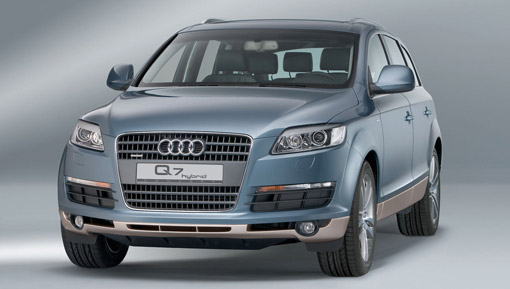
Updated: Despite claims made by Audi board manager Frank Dreves as recently as May that a petrol-electric Q7 SUV hybrid was in the works, latest reports indicate the project has been shelved. Speaking with Germany’s Der Spiegel, a spokesperson for the company said that the Q7 won’t be fitted with a hybrid system because sales predictions for such a vehicle were too low.
Audi’s U.S. chief Johan de Nysschen confirmed back in March that the Q7 hybrid had been ruled out for the U.S. market, the single biggest market for hybrid vehicles and SUVs. Instead, Audi will develop other hybrid models and continue to work with Porsche and Volkswagen to develop the technology.
Original: Audi will beat its German rivals in the hybrid race with the launch of a petrol-electric Q7 SUV due at the end of the year. The announcement was made by Audi board manager Frank Dreves, who revealed today that the hybrid SUV is being developed together with Porsche and that future collaboration on electronic architectures with the sports carmaker was possible.
Dreves also revealed that Audi would increase its modular design practice and standardization of components – a process where a number of different models in different segments are all based on the same platform – in order to reach its target of 1.5 million vehicles by 2015.
Speaking with Automotive News Europe, Dreves also pointed out that Audi will lift its model range from the current 26 vehicles to 40 all up by 2015. The key will be to improve productivity, shorten the production cycle of each model and increase the level of component sharing.
Audi has ruled out launching the Q7 hybrid in the U.S. because of the weak dollar and low demand for petrol-electric hybrids in general. However, Audi’s U.S. chief Johan de Nysschen revealed that a hybrid Q5 was in the works and would be a likely option for North America.
The new Q7 hybrid due at the end of the year will feature a 34kW electric motor sandwiched between a 280hp (206kW) 3.6L V6 FSI petrol engine and the vehicle’s torque converter. The electric motor provides an additional 285Nm (210lb-ft) of torque to the internal combustion engine’s 375Nm (277lb-ft). From standstill, the concept vehicle reaches 100km/h in 7.6 seconds and can accelerate from 60 to 120km/h in fifth gear in just under 12 seconds. Despite weighing 2,480kg, average fuel-consumption measures 24mpg (9.8L/100km).